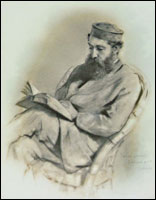![]()
The contents on this page remain on our website for informational purposes only.
Content on this page will not be reviewed or updated.
 |
|
 |
|
|
||||
|
Wicken: The Reverend Hugh Nelson-Ward
|
||||
|
||||
|
Having little desire to voyage beyond the bounds of North Bucks, at school the enforced study of French always seemed rather pointless.
Although a brief interest had once been aroused, when it was revealed that a mademoiselle on the teaching staff had been entertaining the Head Boy to some extra curricular ‘French lessons.’ However, when rumbled her secondment sadly came to an end, and she was swiftly packed off back across ‘la Manche,’ tres vite. As for other French advances, in days gone by these had been chiefly of the Napoleonic kind, and the local villages of Cosgrove and Swanbourne would be the home of two of the Admirals who commanded warships at the Battle of Trafalgar. As for Wicken, from 1909 until 1928 the rectory became the home of the Reverend Hugh Nelson-Ward, who was the grandson of Horatia, the illegitimate - not that he ever acknowledged this fact - daughter of Admiral Lord Nelson. In great secrecy Horatia had been born at 23, Piccadily, London, in January 1801, and in the early days of the following month her mother, Lady Hamilton, took her to a Mrs. Gibson, ‘a lady without a husband,’ in Little Titchfield Street. There, in return for a monetary sum, Lady Hamilton asked Mrs. Gibson to look after the child, and with this agreed she quickly drove away in a waiting carriage. In time Horatia would marry Philip Ward, a Norfolk clergyman, and although a ‘large and sturdy’ family would be the result, more sturdy would be the sensitivities of other members of the family, since for many years the true parentage of Horatia would cause them great embarrassment. Horatia’s eldest son became the rector of Radstock, in Somerset, and it would be there that his son, Hugh, the future rector of Wicken, was born in 1863. Before attending Salisbury Theological College, Hugh had begun his education at King’s School, Bruton, and Brasenose College, Oxford, and after various incumbencies he became rector of Wicken in 1909. There he would keep a large collection of ‘Nelsonia,’ including a death mask that no one but himself was allowed to touch, and although some of the memorabilia had descended through the family via Horatia, many of the other items Hugh had purchased at auction. In 1928, on the advice of his doctors Hugh retired, and at a farewell presentation, held in the schoolroom one Tuesday evening in April, he received a cheque for £106 15s 6d, as an appreciation from his parishioners and friends. Giving a suitable reply, he said that he would be sad to leave, and that he sometimes wondered if he had grown too fond of the church that he loved, of the parish that he loved, and of the garden that he loved. Taking his collection of relics, he moved to 32, Marlborough Buildings, Bath, and there few would know that he had taken holy orders, since he preferred to be known simply as Mr. Nelson-Ward. As for his collection of ‘Nelsonia,’ this he presented to the National Maritime Museum, where in 1939 a special gallery for their display was opened. Early during World War Two the Reverend’s Georgian home at Marlborough Buildings was severely damaged by enemy action, and in consequence, especially in view of his failing health, he decided to move to a private nursing home and guest house at 7, The Circus, Bath. Retaining only a few possessions, he arranged for the rest to be auctioned, and the impending sale aroused such interest that in November 1942 even Queen Mary came to view the items. At the age of 90, the Reverend Hugh Nelson-Ward, a lifelong bachelor, died on Saturday, March 21st 1953, and with his funeral being held at Bath Abbey, there he lies buried in the Abbey Cemetery. |
||||
|
|
||||
|
|
||||


